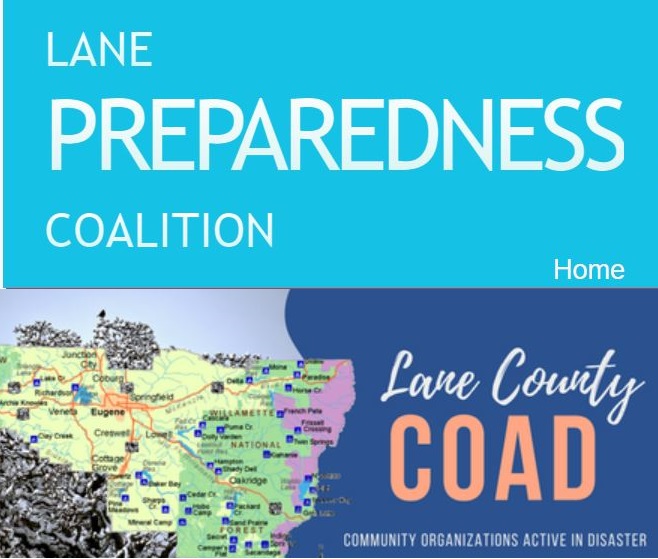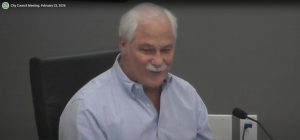COAD builds powerhouse management team for 2022
7 min read
Community Organizations Active in Disaster—the Lane County COAD—builds a powerhouse management team. From Central Aid Agency, Ben Bower.
[00:00:09] Ben Bower: So every year the general members have to reelect the leadership team for that upcoming year. And so just a recap of who is on the leadership team right now.
[00:00:19] We have Allison Westerhoff with Saint Vincent de Paul; me with Central Aid Agency; Carisa Hettich with Red Cross; Cary Lieberman with Greenhill Humane Society; Bianca (Bell) with Resource Tap, Devin Thompson with McKenzie Valley Long Term Recovery Group; Jared Pruch with United Way of Lane County; John Ross with Food for Lane County; Patence Winningham, Lane County Emergency Management; Selene Jaramillo with Lane County Public Health. So I believe that is everyone.
[00:00:52] Patence Winningham: Thanks Ben. I noticed that we don’t have any representation on the leadership team from our city partners. And I see Carrie is here. I’m not sure if we want to add or see if there’s interest in adding a representative from the city on the leadership team?
[00:01:05] Ben Bower: Yeah, I would love to have the city representation on the leadership team. What do you think, Carrie? Carrie Karl is interested in joining leadership team, so we’ll add you.
[00:01:17] John Q: And that’s how the COAD rolls. From Central Aid Agency, Ben Bower.
[00:01:21] Ben Bower: Not a problem. Hey, my organization, we have a saying called Semper Gumby, always flexible. So we’re just rolling with it today.
[00:01:30] John Q: Ben gave a quick update.
[00:01:31] Ben Bower (Central Aid Agency): We’re going to be involved with the Lane County Fair this year, helping the Lane County Mounted Posse do some of the traffic control so we’re starting to look forward to that and some of the planning behind that. We just graduated our first basic disaster academy CERT class since the pandemic, so it’s really great that we’ve got five new certified responders.
[00:01:49] We’re looking forward to doing more training now that things are getting a little more normal. So we wanted to cross train all of our people in both CERT and Search and Rescue. And we have the knowledge base now to build those, the curriculums and to do them. So just continuing to build capacity, right? Getting ready for fire season and other events that are upcoming.
[00:02:11] Andy Davis: CERT just finished graduating their spring basic class. We have set in place, our 20 22 training on the first Thursday of each month. Plus we also have a couple of Saturdays. Training, which will entail CERT emergency communication and then the other one will be CERT traffic and crowd management.
[00:02:33] We have two other CERT basic classes, one in June for the summer class, and then we have a fall class as well. The third class is if the hands-on portion after the students go through and do the FEMA course online through the University of Utah. So we’re pretty busy there.
[00:02:51] The Eugene emergency communication network structure is in place. We have a weekly training on the air on Wednesdays. And so this year’s project is to build damage assessment teams within the neighborhood.
[00:03:07] Cary Lieberman (Greenhill Humane Society): Disaster- related, we are also continuing to build infrastructure. We do actually have, oh, I think it’s a couple hundred pets go kits that we’re planning to distribute to the community. In the coming months we’re actually looking for some events to piggyback on to, if there are members who are putting together disaster fairs, education events, along those lines, we’d be happy to come out and talk to people about being prepared for disaster, then your pets.
[00:03:37] David Monk (Ready Southeast): David Monk from Ready Southeast, it’s a Eugene neighborhood-based preparedness program.
[00:03:42] We do have a matching grant in with the city currently to purchase what I call job boxes. And these are large metal storage containers to contain emergency supplies, and these would be distributed throughout our neighborhoods so that are now almost 70 volunteers would have immediate access to emergency supplies in the event of a disaster.
[00:04:08] Some of you may know of a group called PathfinderEX. They’re a group out of Bend, a lot of National Guardsmen that are part of this 501C3 we’re working with. Don and I have been meeting with their group for some time to do a preparedness exercise. We have it scheduled for May 22nd at Alton Baker Park all day long. In case any of you all want to participate, we would love to have you.
[00:04:34] Carrie Karl (City of Eugene Emergency Management): Our preparedness plans, in particular Eugene Springfield Natural Hazard Mitigation Plan, it has to be updated and reviewed every five years. So we’ll be looking at some of the cultural / social vulnerability indexes that are out there and overlaying it with hazard information that’s been updated by DOGAMI recently, but also the Army Corps of Engineers and helping to get a better picture of what our vulnerability looks like for the Eugene Springfield Metro area.
[00:04:59] We’ve been working on our Emergency Support Functions and really what are those core capabilities? What are those things that we need to test to make sure that we can attain what we need to, for Whole Community Preparedness? So we’ll submit out to the rest of the city for review.
[00:05:14] And then of course, preparation for the World Championships coming in July (woo!), and what we’re looking at too for the Riverfront Festival, what that footprint’s going to look like, security measures in place to help and support our community to be prepared in the event of anything that might happen as a result of these games bringing us to a world stage. And making sure that we’re prepared and planned not only on the law enforcement front, but also in our disaster response, in our response by EMS and Fire. So lots of work happening on that to make sure that we’re prepared and also getting good information out to the community. So I’ve been meeting a lot with our PIOs, Public Information Officers, across the city to make sure the community is well-informed.
[00:05:55] Patence Winningham (Lane County Emergency Management): The All-Hazard Sheltering Task Force, that planning continues to move forward. The group meets on a monthly basis and they’re working through weather triggers and when we need to stand up inclement weather shelters. So, a heat dome scenario versus 34 degrees and below for five days, what’s that look like across Lane County? And supporting a training and exercise for those community partners that do stand up to be warming or cooling shelters or cleaner air facilities. And how do we help them establish thresholds and triggers, but also get them training and resources to support their needs.
[00:06:27] So for October of 2023, I am holding the dates to rent the fairgrounds for an emergency preparedness fair. And like David Monk, I’m working with PathfinderEX to have some partners and sponsors to support that effort. And so more on that to come in the near future. But I’ll turn it over to Selene.
[00:06:46] Selene Jaramillo (Lane County Public Health): Thanks. COVID: Cases are still going up. We are not seeing yet the impact to hospitalizations and deaths from the increase in cases. We are not seeing anything at this time yet that would make us pause, but we continue to monitor; the Health Department is still very much activated for COVID at the department level.
[00:07:09] And we are continuing to offer lots and lots of vaccination opportunities. But at the same time, we are trying to normalize the way information is distributed. So not so much running a call center anymore, limited hours and very limited staff on that. So that’s it for COVID.
[00:07:28] The only other thing is, we are going to be able to retain some of the resources that we, the health department got, including the preparedness programs. So that means I’m going to have a total of three staff, including myself, in the very near future. And then we’ll be letting you know what sort of things we’re able to focus on. Things like, for example, the impacts of climate change on the community and collaborations with community organizations, for equity driven types of initiatives to mitigate some of those health effects of climate change, that will be part of the preparedness work going forward.
[00:08:10] Tim Black (Egan Warming Centers): Hi all, we’re trying to move away from having people think that Egan is specific calendar dates because we do want to be available if it gets cold and we got really close last week, so we held off on having a big announcement we’re done.
[00:08:23] But I think now we’re done. So now we’re scheduling our volunteer cleanup sort put away parties, which is also an opportunity to say, thank you.
[00:08:33] Matt Pemberthy (United Way): Hi, everybody. United Way is working with a facilitator named Ana-Marie Jones, who also facilitated series back in 2009-10-11 in partnership with Selene and their department. And which eventually was more or less a catalyst in forming the Lane COAD.
[00:08:56] So essentially we’re hosting a four-part virtual series for rural community organizations. And the intention for the series is to build more of a network of community preparedness. The first session kicked off last Wednesday and there are three more coming up throughout April and May. And then we’ll wrap up in June.
[00:09:20] Carisa Hettich: This is Carisa Hettich from the Red Cross. Not too many updates on our side. The Red Cross held the shelter exercise and simulation a couple of weekends ago. It’s went really well. And I’m glad that a lot of partners were able to come out and kind of experience and kind of go through the motions about setting up a shelter and it’s always good to have a dry run before, we have to do that. So glad for all those who were able to participate could do that.
[00:09:46] John Q: A new management team helps the COAD prepare for the summer of 2022.




